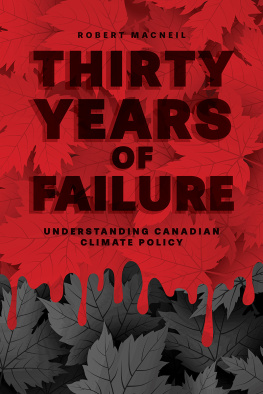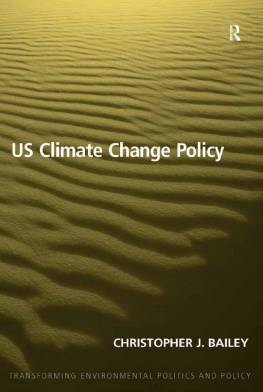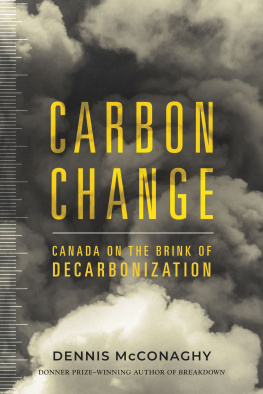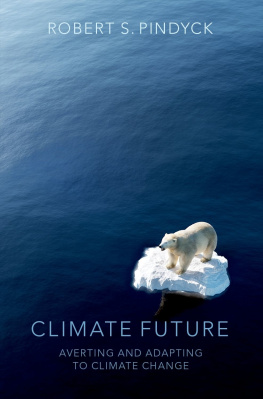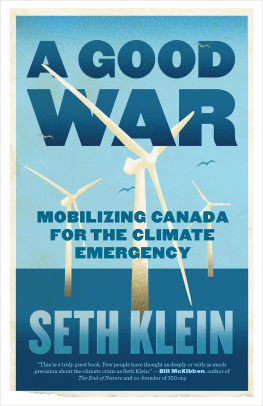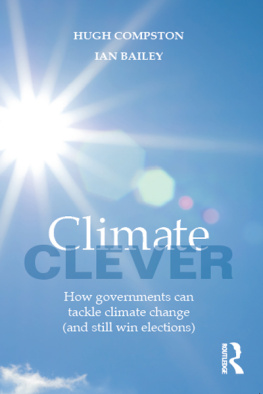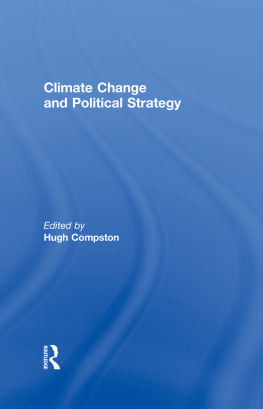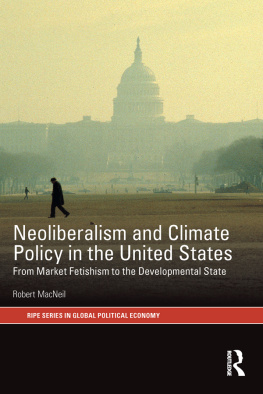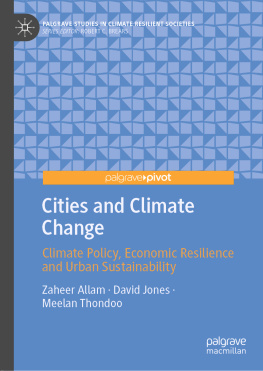THIRTY YEARS OF FAILURE
THIRTY YEARS OF FAILURE
UNDERSTANDING CANADIAN CLIMATE POLICY
ROBERT MACNEIL
FERNWOOD PUBLISHING
HALIFAX & WINNIPEG
Copyright 2019 Robert MacNeil
All rights reserved. No part of this book may be reproduced or transmitted in any form by any means without permission in writing from the publisher, except by a reviewer, who may quote brief passages in a review.
Editing: Candida Hadley
Cover design: Jess Koroscil
eBook: tikaebooks.com
Printed and bound in Canada
Published by Fernwood Publishing
32 Oceanvista Lane, Black Point, Nova Scotia, B0J 1B0
and 748 Broadway Avenue, Winnipeg, Manitoba, R3G 0X3
www.fernwoodpublishing.ca
Fernwood Publishing Company Limited gratefully acknowledges the financial support of the Government of Canada, the Canada Council for the Arts, the Manitoba Department of Culture, Heritage and Tourism under the Manitoba Publishers Marketing Assistance Program and the Province of Manitoba, through the Book Publishing Tax Credit, for our publishing program. We are pleased to work in partnership with the Province of Nova Scotia to develop and promote our creative industries for the benefit of all Nova Scotians.

Library and Archives Canada Cataloguing in Publication
Title: Thirty years of failure : understanding Canadian climate policy / Robert MacNeil.
Names: MacNeil, Robert, 1984- author.
Description: Includes bibliographical references and index.
Identifiers: Canadiana (print) 20190137428 | Canadiana (ebook) 20190137509 | ISBN 9781773632223
(softcover) | ISBN 9781773632230 (EPUB) | ISBN 9781773632247 (Kindle)
Subjects: LCSH: Environmental policyCanada. | LCSH: Climatic changesGovernment policyCanada.
Classification: LCC GE190.C2 M33 2019 | DDC 363.7/05610971dc23
CONTENTS
For my dad, the wisest person Ive yet known.
ACKNOWLEDGMENTS
Im hugely indebted to all those who have helped and inspired me in one way or another with this book. In particular, enormous thanks goes to the dedicated activists I have been fortunate enough to have met within the Canadian climate movement over the past several years. Their influence provided lots of much-needed inspiration during the process of putting this book together. A huge thanks to my editor Candida Hadley for her keen eye, brilliant insights, and encouragement throughout the drafting and publication process. Thanks also to Beverley Rach, Curran Faris, and the fantastic team at Fernwood for all their help and support. Most importantly are my family and close friends, whose support over the years is incalculable Mom, Dad, Kayla, Evan, Vince, Christina, Jeannie, Dave, Clarissa, Leigh, and James. The biggest thanks of all goes to Maddy Beauman, without whose love, support, kindness, friendship, and smile, Id hardly see the point.
PREFACE
In 2015, I was part of a panel event in Toronto organized by a group of local environmental and climate activists. During the Q&A section of the event, one of the attendees presented me with a question that I was embarrassingly underprepared to answer. Her question was: As a political science scholar who studies climate change, you must have a pretty good sense of exactly why Canadian climate policy keeps failing. Given that knowledge, what specifically would you tell a group of activists and ordinary citizens about what needs to be done to fix the situation, and how we can be most effective in creating the changes we want to see?
The question caught me pretty off guard. So, I did what most academics do when they get a question they cant answer I bullshitted. I gave a long-winded response that basically amounted to nothing. When I was done talking, I sheepishly said to her, I hope that sorta answers your question. She looked at me with an unimpressed expression and said, Meh, not really, but thats fine.
The exchange was unfortunate because her question was a vitally important one. Particularly in a country as complex as Canada with so many institutional, political, and economic bottlenecks the climate problem seems so enormous and vexing that its hard to even know where to start. Its in this context that most climate activism basically amounts to abstract calls for action, without knowing exactly where to direct ones attention, or what institutions or economic structures to focus on.
This book is an effort to provide a proper answer to the question posed that evening. It draws on political, economic, and cultural research on climate change to give readers a sophisticated understanding of precisely why Canadian climate policy has been such a disaster over the past thirty years, and explains how this knowledge can be used to create the changes that are desperately required if we are going to have any chance of solving this issue.
Big Bay Point, Ontario
2019
CHAPTER 1
THE RISE & FALL OF CANADAS CLIMATE LEADERSHIP
It all started out pretty well
As one former staffer from Environment Canada noted to me in an interview, Despite all the calamity thats happened since, the early history of Canadian climate policy actually started out pretty well as I recall.
It was the late 1980s, and after decades of debate the worlds scientific community had arrived at a solid consensus around the dangers of anthropogenic climate change. What was required now was for a handful of countries to claim the mantle of leadership and push for bold international action to begin addressing the problem. Unsurprisingly, Canada was at the front of the pack. Unsurprising because we had seen this many times before over the preceding twenty years. Whether the issue was ozone depletion, species extinction, transnational air pollution, or hazardous wastes, if there was a pressing global environmental crisis, Canada was going to use its status as a revered middle-power nation to help lead the international community to a workable solution.
So, it was not terribly surprising that, in 1988, the Canadian government, led by Brian Mulroneys Progressive Conservatives, volunteered to host one of the first major meetings of the international community on climate change. Colloquially referred to as the Toronto Conference on Climate Change, the Mulroney government not only sought to put climate change on the global policy agenda, but it was also among the first governments in the world to propose a potential solution. The Canadian delegation suggested an international law of the atmosphere, modeled on the existing Law of the Sea, arguing that climate change required a holistic effort that acknowledged the links between all atmospheric issues, and that all members of the international community should have certain duties and responsibilities for ensuring a stable climate for current and future generations.
While Canadas efforts at the Toronto Conference ultimately failed in the face of US resistance, the Mulroney government nevertheless kept up its rhetorical efforts, pledging to fully stabilize Canadas greenhouse gas (GHG) emissions within a decade, and becoming one of the first countries in the world to ratify the United Nations Framework Convention on Climate Change (UNFCCC). Not to be rhetorically outdone, upon forming government in 1993, Jean Chrtiens Liberal government vowed to enhance Canadas efforts on climate change, proposing even stronger targets, along with a series of policy ideas aimed at achieving them.
Indeed, it all started out pretty well.
But, since then
But Canadas performance since then has been dreadful. Not only did Canada fail to stabilize or reduce its emissions as promised, but its general behaviour on climate has, according to numerous NGOs and partner states, been deplorable. Beginning in the early 1990s, Canada joined a much-maligned coalition of blocking states in the UN climate negotiations that consistently sought to weaken and derail any substantive efforts to build a functional global climate treaty. After succeeding in watering down the regulatory framework for the regime, Canada signed the resulting Kyoto Protocol, but failed to take any significant domestic efforts to meet its commitments. In an attempt to create some semblance of action, the Chrtien government implemented a series of weak and ineffective voluntary programs and subsidies for various sectors which, unsurprisingly, yielded few positive outcomes. As a result, not only did Canadas GHG emissions fail to decline by 6 percent (as formally promised at Kyoto), but between 1990 and 2006, they actually increased by 27 percent, making Canada the treatys most flagrant violator.

